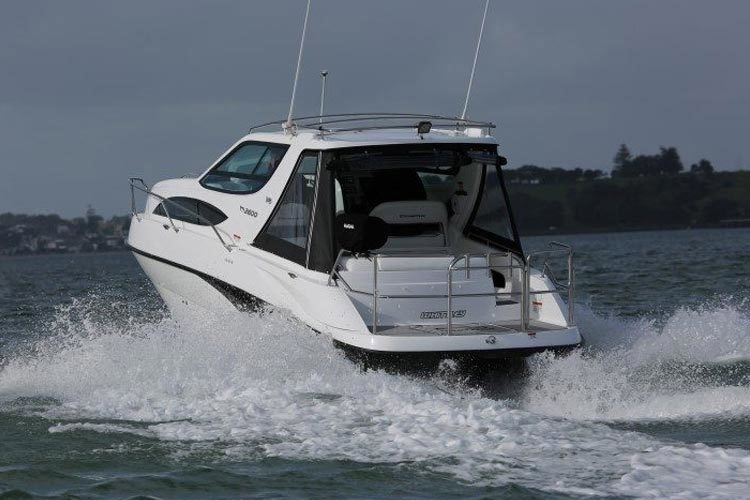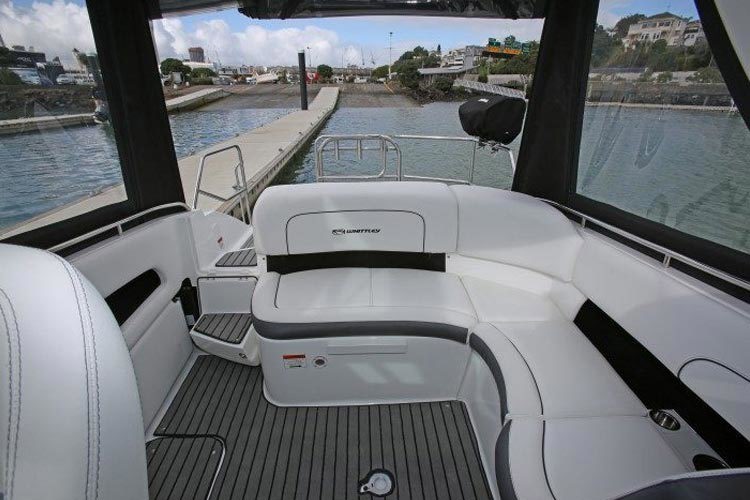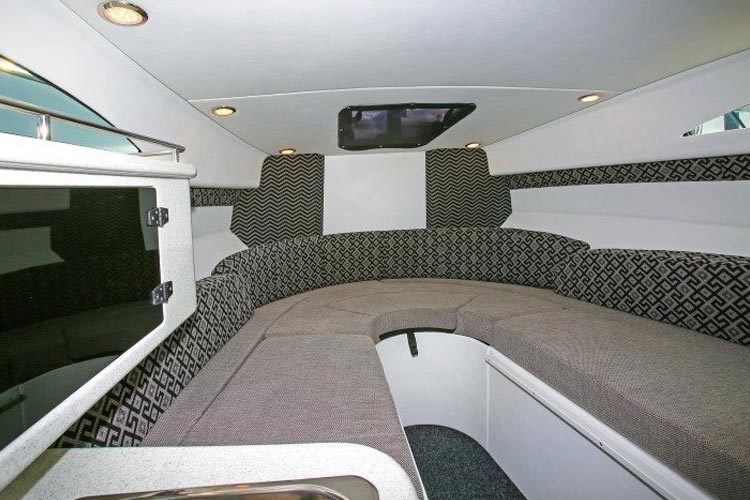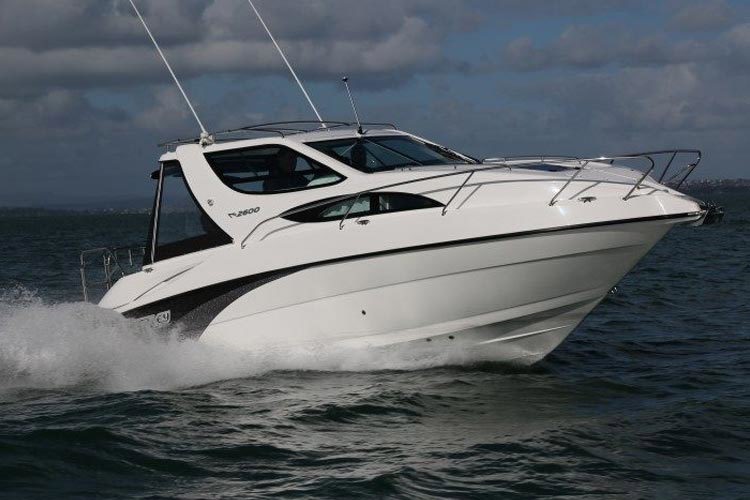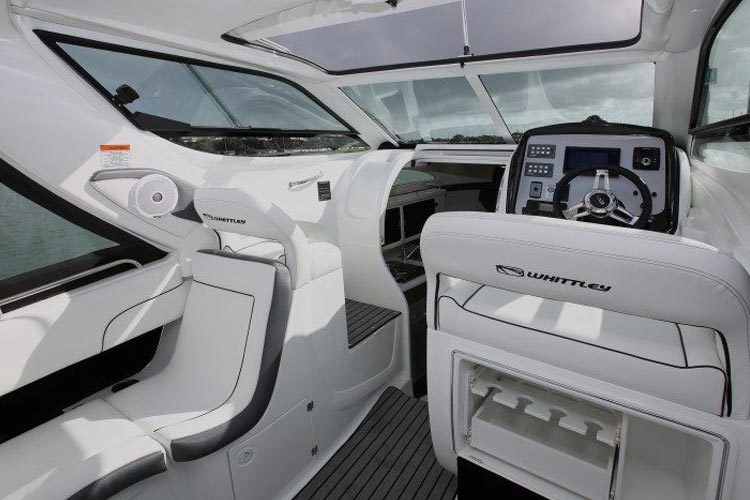CR 2600 SD Boating NZ
Performance is quite brisk, especially acceleration.
Whittley’s new CR 2600 model – the second-largest in the company’s Cruiser range, is an ideal vessel for a quick, spur-of-the-moment weekend escape.
Released in Australia late last year, this boat is the first CR 2600 sold in New Zealand, supplied to a Blenheim couple by Whittley dealer Bensemann Boating Centre in Auckland. Bensemann is awaiting the arrival of a second, pre-sold CR 2600, with more on order.A trailerable family cruiser, the CR 2600 is generously equipped and surprisingly spacious inside, thanks to its tall, curvaceous forward cabin. This is a hardtop model with toughened glass windscreens, sliding side windows and drop-covers that completely enclose the cockpit for cosy
overnighting. Only the black canvas and clear-plastic side covers were fitted for our run in the boat.
With overnighting in mind, the double berth forward can be supplemented by a large berth in the cockpit, which converts from the rear lounger with the addition of in-fill panels and squabs. Whittley asserts the rear berth will sleep up to four, which would be okay for the kids; it’s certainly a generously-sized double.
During the day, the cockpit is a comfortable, sociable space with a versatile U-shaped seating arrangement that includes an aft-facing lounger and a fold-out seat on the starboard side. The engine extends mostly under the transom, impacting minimally on cockpit space.
There’s good storage space throughout the boat, including the cockpit: side-shelves with built-in drinkholders; deep, carpeted locker/bins under the seats; space for a chilly bin under the passenger seat and an underfloor locker that extends below the helm seat position for long items like water-skis or poles. A moulded drinks cabinet adds a touch of luxury.Although this is a cruiser set up with family fun days and the odd weekend stay-away in mind, the rear platform allows all manner of water sports activities, including fishing. The platform is deep with Whittley non-slip flooring ensuring good footing when wet, though it’s high enough off the water that your feet should stay dry most of the time.
A stainless-steel tubing cage keeps everyone on the platform safe and also serves as somewhere to mount rodholders (three), an optional bait board, or a rail-mounted BBQ. The cockpit shower and saltwater wash-down are both easily accessed from the platform, there’s a towing eye at water level aft and a large, but shallow, storage locker set into the platform sole.SPACIOUS LIVING
There was no gas bottle on this boat, though gas is an option. Instead, the single-burner cooktop in the 2600’s compact galley runs on methylated spirits, while the Magma BBQ on the rail is a canister model.The galley, on the port side just inside the lockable, sliding GRP cabin door, includes a sink, a reasonable amount of storage for cutlery, plates and dry stores in under-bench and overhead cabinets, and a 12-volt fridge. Opposite is the fully enclosed head, unusually spacious for a trailer boat, with an electric toilet and a small sink-vanity with a pull-out shower. Like the galley, it features an electric extractor fan.
The forward cabin is surprisingly spacious. Seating wraps right around the interior. It’s almost a U-shape, with shelving above the low backrests and under the windows and storage under the hinged seat/berth bases. It will seat four adults easily with plenty of headroom under the vinyl-lined ceiling and provision to drop in a table for a more social layout.The infill panel, along with others for the cockpit, is stored against the bulkhead, clipped up out of the way. The backrests are re-purposed to turn the whole of the forward cabin into a large double berth. All the vessel’s opening hatches and ports feature insect screens, which should keep Marlborough Sounds’ hungry sandflies at bay.
INBOARD PETROL POWERPower for this boat is supplied by a Volvo-Penta 240hp V6 direct-injected petrol engine driving through a Volvo DP leg (duo-prop). It is a lightweight aluminium unit, freshwater cooled, and though the CR 2600 is rated for petrol or diesel engines up to 300hp, the 240hp V6 provides plenty of urgency. The standard engine is a 200hp version of the same 4.3-litre block.
The batteries (with Volvo Battery Management System) are nicely tucked away on the starboard side, along with the inbuilt battery charger and QL Neutra-Salt system. There’s a three-pin mains power lead on the port side to preheat the hot water cylinder at the dock; hot water is normally engine heated – the boat carries 100 litres of freshwater. LED lighting includes foot lighting, all interior, running, anchor and navigation lights, plus a transom light.Performance is quite brisk, especially acceleration. The transition onto the plane is quick and efficient and throttle response is good throughout the rev range. Whittley has taken quite a bit of trouble with sound insulation in the engine box, so engine noise is well-muffled, though there’s a pleasant V6 snarl when the Volvo is on song. At idle, the engine is extremely quiet.
During our run, we managed a brief burst of 32 knots at 5600rpm, just short of the engine’s maximum 5800rpm, but this was the first time
the Volvo Penta had been run. At 21-22 knots, a comfortable cruising speed, fuel consumption was a respectable 37 litres per hour, and this may fall slightly as the engine loosens up. The Whittley carries 200 litres of fuel underfloor.
A Zip Wake automatic trim tab system keeps the boat on the straight and level, adjusting for pitch and roll. It wasn’t fully calibrated yet, so we used the tabs in manual mode, but the interrupter-style trim tabs are certainly effective, fast-acting and easy to adjust using the scrolling wheel controls.
Even though the Whittley carries its weight low compared to an outboard-powered vessel, this hull has a deep-ish 19-degree deadrise at the transom and a fairly tall hardtop, so tabs are welcome.
The boat coped admirably with a bit of wind chop, providing a comfortable ride. The 2600 runs fairly level, the entry making easy meat of smaller waves and the wipers dealing to any spray reaching the windscreens.
COMFORTABLE HELM
The helmsman and front seat passenger(s) sit up quite high. This should provide excellent all-round vision and it does to a point. But the windscreen mullions are quite thick, so there are blind spots in the corners and I also noticed I couldn’t see the bows over the sloping foredeck, which is not ideal.
Even when I stood up and put my head through the open roof panel I couldn’t quite see the anchor. The sliding roof panel is great: simple to operate with a basic rubber catch to retain it, much like the sliding door to the cabin.
The helm position is good too and everything is laid out logically. I liked the feel of the soft-touch wheel, while the throttle lever is positive and doesn’t move on its own if you remove your hand as sometimes happens. It’s a cable installation, but nice and smooth.
The moulded dash can accommodate up to a 14-inch display; a smaller Garmin GPS Map 7407 was fitted, plus the VHF radio, switch panels, trim tab and anchor controls. C-Zone digital switching is planned for subsequent boats, reducing the demand for console space. A Fusion stereo head unit is located in the forward cabin.
Anchor duties are undertaken by a Quick windlass operated remotely from the helm. It deposits the rope-chain rode into an anchor locker with twin hatches. There’s no access to the anchor locker through the forward bulkhead, but access to the bows is quite good around the hardtop, which sports stainless ‘roof racks’ to hang onto.
These are sturdy enough for paddleboards or a small inflatable dinghy, perhaps even kayaks. Foredeck padding is a Whittley option for this model, complementing built-in drinkholders, as is the removable stainless-steel boarding ladder for the bows. It’s a feature also seen on many Kiwi boats destined for the South Island.
MACKAY TRAILER
The CR 2600 is supplied on a heavy-duty Australian Mackay trailer. It’s a galvanised steel, dual-axle braked trailer, with in-car electric-over-hydraulic braking control, a spare wheel and a jockey wheel. It’s a centre-roller, keel line design with bunks, which, according to Whittley, supplies better support to the hull.
On the road, the rig weighs around 3.2-tonnes.
Review Details
- Publication:
- Boating NZ
- Writer:
- John Eichelsheim
- Article Link:
- https://boatingnz.co.nz/boat-reviews/whittley-cr-2600/
